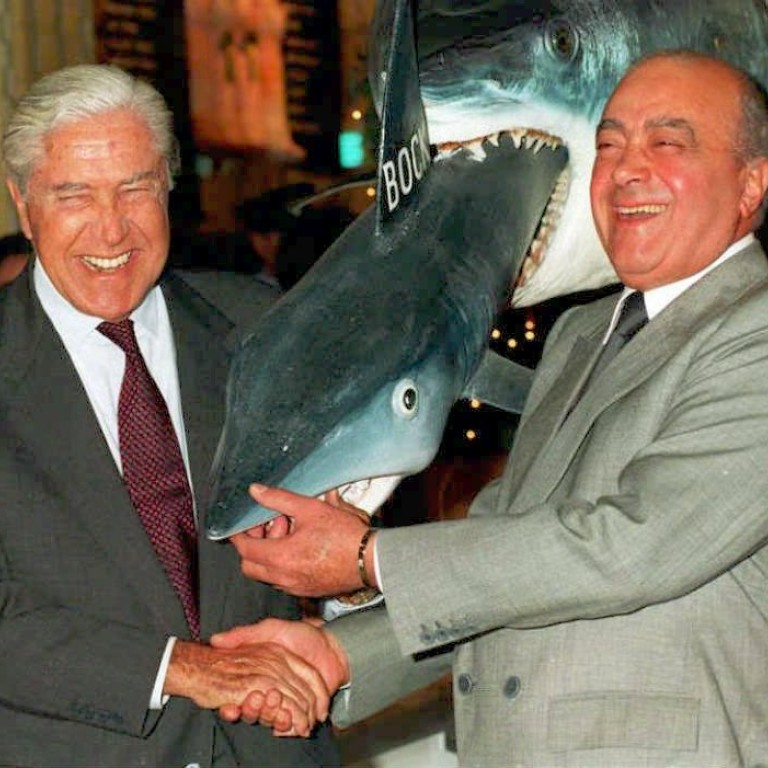
Bitter rivalries can goad firms to greatness
Famous feuds in the business world, aside from making good headlines, can drive good corporate outcomes when outsized egos push boundaries
Bitter personal rivalries are hardly unknown in the business world, and they are found at every level, from fiercely competing family stores to massive conglomerates.
Business schools tend not to have this sort of stuff on their curriculums, though their "experts" may solemnly pronounce on the wasteful nature of bitter personal business rivalries. But are they right?
The jewel in the crown was Harrods, and Rowland and al-Fayed were keen to own it
I have to admit that musing on this matter was brought on by a burst of nostalgia when reading about the imminent takeover of the House of Fraser, the British retailer, by Yuan Yafei's mainland-based Sanpower group.
Yet again, a controversial high-profile buyer is seeking to buy this iconic retailer, a former owner of the Harrods department store. It is highly unlikely that Yuan's attempt to buy the British retailer will be anything like as bitter or as lively as Roland Rowland's Lonrho group's battle to acquire the House of Fraser in the early 1980s.
In 1981, Britain's Monopolies and Mergers Commission blocked Rowland from getting his hands on the retailer, but - much to everyone's surprise - it gave the green light to his purchase of , a newspaper that I joined in the same year, working on the business desk.
The very tall Rowland, better known as "Tiny", was a controversial character. His methods had famously been described in 1973 as "an unpleasant and unacceptable face of capitalism" by the then British prime minister Edward Heath. After Tiny's takeover was blocked, he embarked on a remorseless campaign in to blacken the names of his enemies, especially Mohammed al-Fayed, a former ally who snatched the House of Fraser from Lonrho by methods that fell short of the rules of cricket.

Eventually I became the deputy business editor but was out of the loop of the constant to-ing and fro-ing between the business editor and two other staff members who handled "all the Tiny stuff".
In fact, I often felt that there were two business desks, one that handled the affairs of Tiny, his opponents and his friends - to whom he was both loyal and generous - while the other dealt with everything else.
I have never before or since been a first-hand witness to this level of obsession. It is widely believed that it eventually led to Tiny's ousting at Lonrho, where he was accused of spending too much time settling personal scores.
I shared this view, no doubt influenced by the weird situation at and my firm exclusion from Tiny's circle of trustees. However, I am not sure any more.
First, it needs to be stressed that there would have been no Lonrho without Tiny. He was an outsider from a German family with an outsized personality (on the two occasions I met him, I must admit to having been charmed but felt the need to check my wallet on leaving the room).
It was Tiny who tirelessly worked his way around Africa, befriending leaders and seizing opportunities shunned by other companies that simply dismissed the whole place as being the Dark Continent.
And it was Tiny, the quintessential wheeler-dealer, who made Lonrho the go-to company for other businessmen with slightly off-the-wall ideas that needed backing. At one time Lonrho, under Tiny's distinctive control, owned 800 businesses, and its shares were included in the Financial Times 100. After Tiny was ousted as chief executive and then removed from Lonrho's board, the company dwindled in size. It was taken private in 1991 and completely disappeared as an entity last year.
Tiny no doubt wasted a lot of time on his personal rivalries, but he is hardly alone in being spurred on by personal animosity: think of the more recent ego clash between Bill Gates and Steve Jobs and the very famous clash of an earlier technological era when Thomas Edison fought life-long battles with his erstwhile protégé Nikola Tesla.
All these men were fanatics of a kind, and it is hard to believe that they would have built the businesses they built without an obsessive side to their personalities. Great rivalries have produced great businesses, notable examples being the bitter battles between Coca-Cola and Pepsi and that other battleground that had Ford pitched against General Motors in the struggle for supremacy in the US car market.
As these battles raged, much time and effort was wasted, but it remains an open question as to whether the absence of these rivalries, often highly personal, would have led to better or even bigger companies.
My money would be on the notion that it is rivalries that made great businesses and will continue to make many more great companies. People, after all, run corporations, and nothing spurs individuals more than rivalry. Besides which, just imagine how dull the business pages of newspapers would be without these battles.

